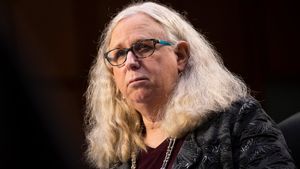Along with other artists like Brandy Clark and Out100 cover star Brandi Carlile, singer-songwriter Allison Russell is carving a space in the world of country and Americana music for queer women. The Canadian-born artist, who now lives in Nashville, knows that queer women, including Black queer women like her, are an important part of the foundation of country music. And she knows that they’re also the future of the genre.
The future is now. In 2023 Russell released her second solo album, The Returner, earning four Grammy nominations to bring her career total to eight. Among other categories, she’ll be vying for Best Americana Album on music’s biggest night on February 4.
Now that she’s firmly established herself as one of the brightest stars in the world of Americana, she’s reaching back and making sure that others like her find their spaces in that world too. And while the work may be hard, Russell says she’s seeing the change happen in front of her.
More women and people of color are going to Americana and folk awards and events, and young LGBTQ+ people come up to her at shows and thank her for creating a place where they feel seen and heard.
At the same time, that new vanguard of queer women is parallel to another movement in mainstream country music where artists like Jason Aldean are having hits with far-right messages and straight cisgender white men are dominating the charts. But Russell is still optimistic.
“I honestly feel that those are dying gasps of that kind of bigotry,” she says. “I think that there is a willful putting on of blinders. There’s just something so incredibly hubristic and also delusional about a genre claiming to be the sound of a country…then to represent the tiniest portion of the population. Look at the top 10 and it’s all heterosexual cisgender white males who at least pay lip service to being Christian.”
Russell says the mainstream country world “has become more and more shockingly far, far right.” And she says it’s un-American.
“Wanting to impose a lack of free will upon so many other humans in America and globally is a shocking position to take for people that claim to love life, liberty, and the pursuit of happiness,” she says. “It’s a sad thing, but I think it has a really short shelf life to be honest. Because the world is moving on — and the same with our legislators in Tennessee — which is the physical home of the modern country mainstream music movement.”
Russell was one of the organizers of Love Rising, a recent benefit concert held in Nashville that raised money for LGBTQ+ causes in response to transphobic and homophobic laws in the state. The fight is far from over.
“It’s probably going to get uglier before it gets better, but it will get better, and it is getting better,” she says. “To be honest, music in and of itself, art in and of itself, fights that kind of fascist thinking. It never wins. It does a whole bunch of damage while it’s trying to be ascendant, but it just never wins. It doesn’t make good music either, because music is about cross-pollination. It’s about sharing and celebrating our differences. That’s what makes the most interesting music.”
The Americana Music Association is putting in the work, Russell says, to make the genre more friendly for marginalized members, including making plans to have more trans and nonbinary visibility at next year’s awards.
“I just think all you have to do is look at who was nominated this year, who performed this year on the Americana Awards to see the kind of growth that has happened and is continuing to happen,” she adds. “SistaStrings were the first queer Black women to win Instrumentalists of the Year, playing violin and cello. That was unthinkable 10 years ago or even four years ago. So there’s just this beautiful growth. S.G. Goodman winning the [Emerging Act] of the Year and being a queer Kentuckian proudly out for her whole career, those are things that you don’t see happening in mainstream country music.”
Russell herself won the Spirit of Americana/Free Speech in Music Award at that same ceremony. And talking about the ways that queer women are at the head of the genre at the dawn of 2024 brings a smile to Russell’s face.
“That’s so joyful. That makes me so happy,” she says. “It just took 20 years for it to change, but it’s changing now.”
This article is part of the Out January/February issue, which hits newsstands on February 6. Support queer media and subscribe — or download the issue through Amazon, Kindle, Nook, or Apple News on January 23.













































































